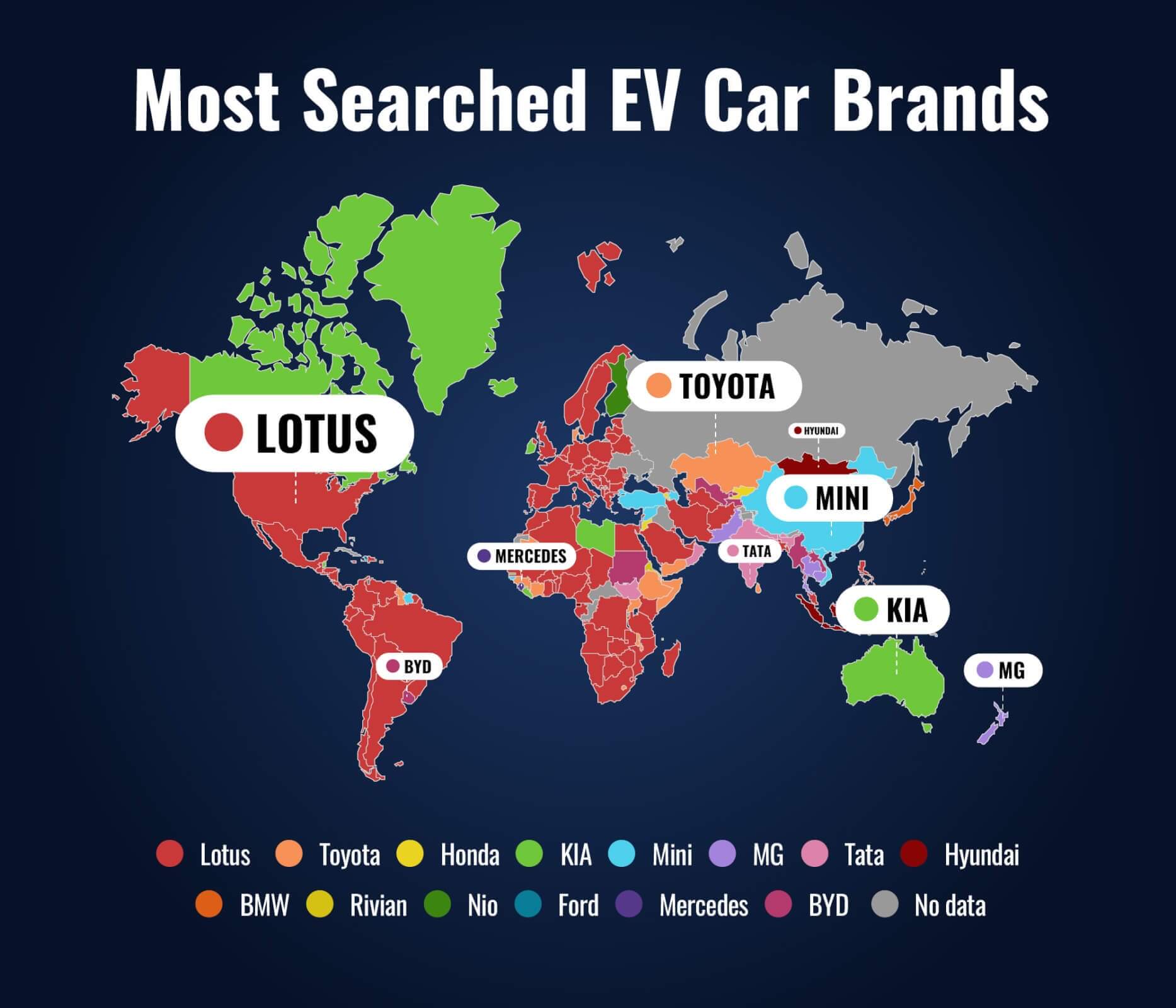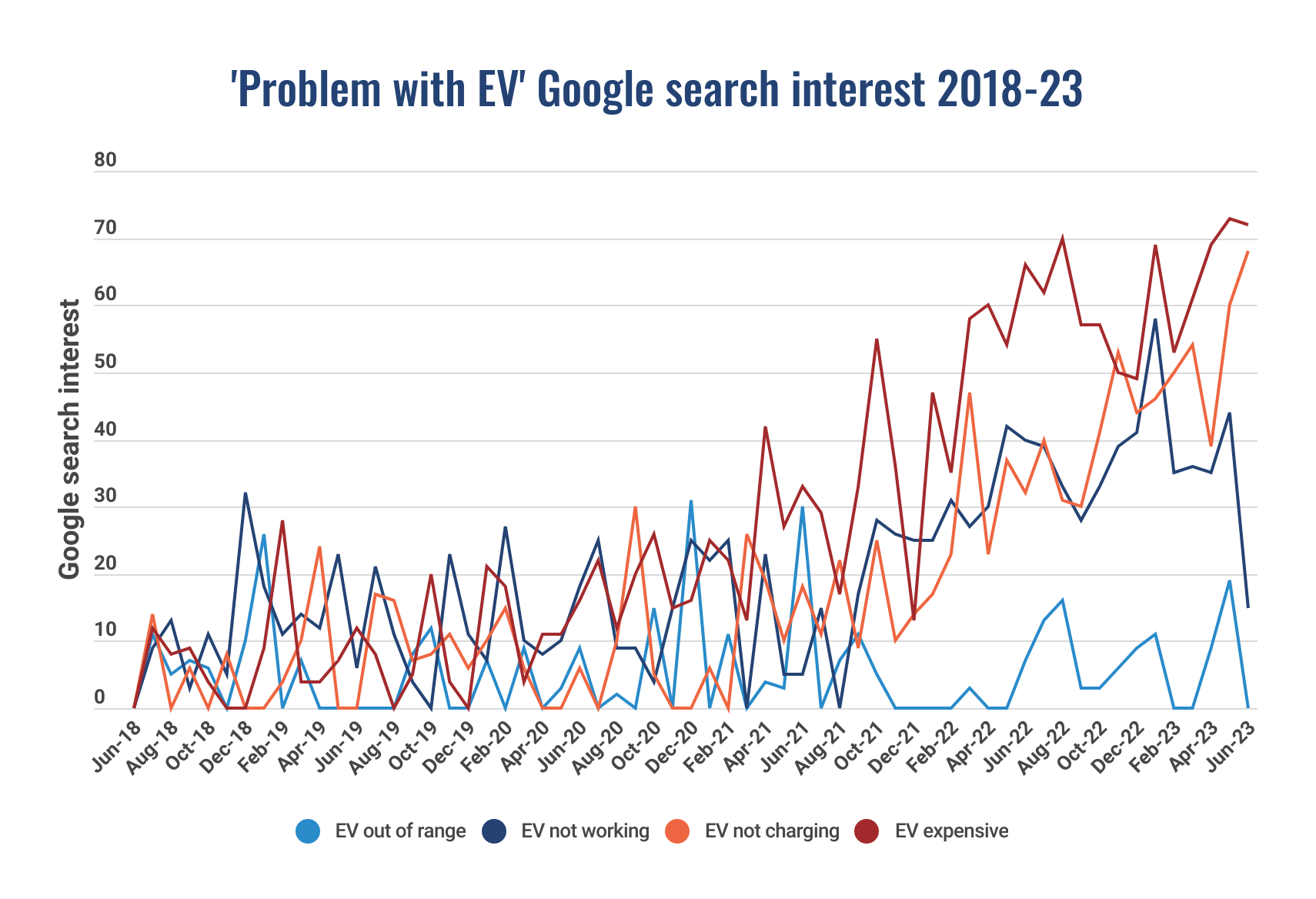The Burrow
The number of electric vehicle (EV) sales has exploded in recent years, with more established brands switching over to electric and hybrid models and new manufacturers entering the market. Countries across the globe have set targets for when new fossil-fuel vehicle sales will cease as they look to an EV future.
As car insurance experts, we wanted to see which brands people have in mind when searching online for electric cars in countries all over the world. Compare the Market has crunched the data from 179 different nations to find out who takes pole position, as well as some other interesting search trends which we’ll get into later.
Let’s take a look at the results.

When looking at searches for brand names and the term EV, there was one clear winner as British supercar brand Lotus left the competition in its dust.
One-hundred-and-two nations across the world searched for Lotus more than any other brand that sells electric vehicles and hybrids, placing it well ahead of the next most-popular brands for this search term.
Lotus was joined on the podium by Toyota in second place and KIA in third. Toyota was the most popular in 18 countries, while KIA was the top choice for 11 countries searching for EVs by car brand.
What makes this more interesting is that Lotus currently only has two electric models currently available as of time of writing: the Eletre luxury SUV and the Evija hypercar. In contrast, Toyota has eight current hybrid models available for sale. KIA currently has three available, with a fourth one (EV9 SUV) coming soon.
Highly conspicuous by their absence was renowned EV manufacturer Tesla. When combining brand names and the acronym ‘EV’ as a search term, not one single country had Tesla as their most popular brand. We looked a total of 70 brands, but 55 didn’t make it onto the table. This isn’t to say that nobody was searching for Tesla or other brands and the term ‘EV’, just that they weren’t the most popular brand for this query in any particular nation.
But given how popular Tesla is as a brand, we decided to dig a little further.
Switching to another search volume tool, SEMRush, and searching for the terms “Tesla” and “Lotus”, it was Tesla that was more popular, with 114 countries favouring Tesla while two favoured Lotus in terms of search volume (SEMRush did not have as many countries available as Google Ads Keyword Planner). It appears that Tesla is so synonymous with electric cars that most people searching online don’t bother to add the term ‘EV’ to their query.
This shows that Tesla remains a highly popular brand, but because we added ‘EV’ to our queries to focus on people specifically looking for car brands that sell electric cars, this popularity wasn’t adequately reflected in our data.
Other brands that were pretty popular in the Google Ads Keyword data included Mini, BYD, Hyundai, MG, Tata and Honda. The table below showcases the results for each brand that were the favourite in at least one country.
| Rank | Brand | ‘X’ countries |
| 1 | Lotus | 102 |
| 2 | Toyota | 18 |
| 3 | KIA | 11 |
| 4 | Mini | 7 |
| 5 | BYD | 6 |
| Hyundai | 6 | |
| MG | 6 | |
| Tata | 6 | |
| 6 | Honda | 4 |
| 7 | BMW | 2 |
| Mercedes | 2 | |
| 8 | Canoo | 1 |
| Nio | 1 | |
| Ford | 1 | |
| Rivian | 1 |
View the full results here.
Some countries had no search results for any car brand terms plus the phrase ‘EV’. This was the case for the Central African Republic, Rwanda and Sao Tome and Principe in Africa, Saint Vincent and the Grenadines in the Caribbean, and Timor-Leste in Southeast Asia.
As electric cars become more popular, there will undoubtedly be an increase in people encountering problems with their automobiles. One thing that became clear in our research was that this was a trend that has largely increased since 2021.
Using worldwide results from Google Trends and focusing on four specific search terms – “EV out of range”, “EV not working”, “EV not charging” and “EV expensive” – we can see the point where interest and search volume for these terms has increased.
While each of these terms sees regular spikes, search interest for “EV not working”, “EV not charging” and “EV expensive” have been steadily rising since the start of 2021, though the term “EV not working” has dropped recently.

Compare the Market’s General Manager of General Insurance, Adrian Taylor, says a transition to EVs poses several challenges for the insurance industry.
“Electric cars have not been taken up quickly in Australia in comparison to other countries, which means insurance companies have less data to work with,” says Taylor. “This can make it harder to calculate risk factors and prices than for more common petrol and diesel cars, because insurance providers are more familiar with those vehicles.”
“Not only are EVs often more expensive than their petrol or diesel counterparts – which affects their value and cost to insure – they have more specialised requirements for servicing and replacement parts. Any mechanic who works on an EV needs to also have high voltage training, which many mechanics and repairers won’t have as they largely service petrol and diesel vehicles,” Taylor adds.
“Roadside assistance can also trickier be as you typically need a specialist technician with equipment to recharge an EV if it runs out of battery – otherwise the only solution is towing. Petrol and diesel cars on the other hand are typically easier to get back on the road, depending on the issue.
“These are challenges that need to be embraced now so solutions can be found as the world continues to transition to electric automobiles, especially as more owners encounter problems with their cars,” says Taylor.
“Whether you have an EV already or plan on getting one in the future, it’s always important to have your EV insured so it is adequately covered.”
We looked at 70 car brands that currently sell electric and/or hybrid cars. We took the brand name then added the term ‘EV’ and ran these search queries through Google Ads Keyword Planner for 178 different nations. The brands were then ranked by the number of countries where that car brand was the most popular, based on Google searches. These search results are based on the past 12 months from June 2022 to May 2023. This data was gathered between 22/06/2023 and 23/06/2023.
For Google Trends data, the top results are subject to change, even historically, due to the way Google Trends samples its data. Google Trends data was gathered on 26/06/2023.